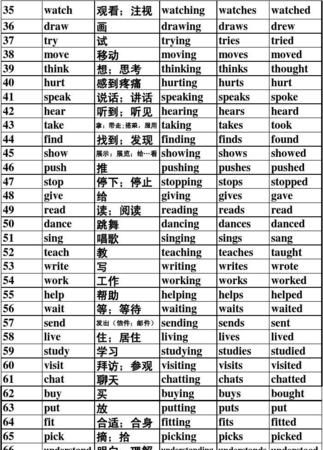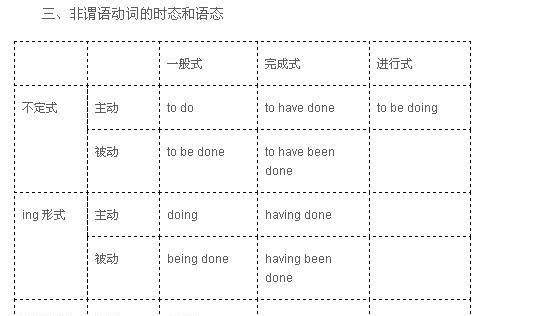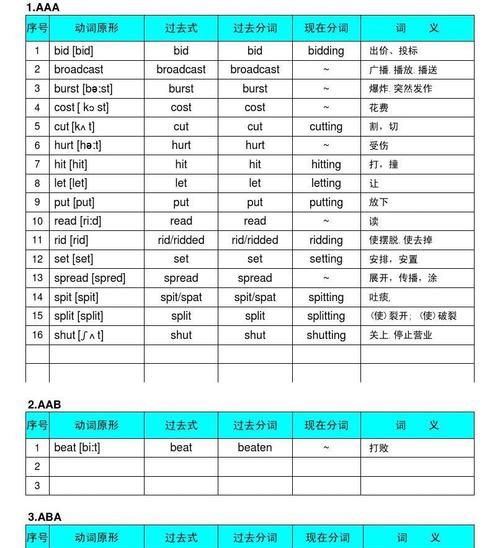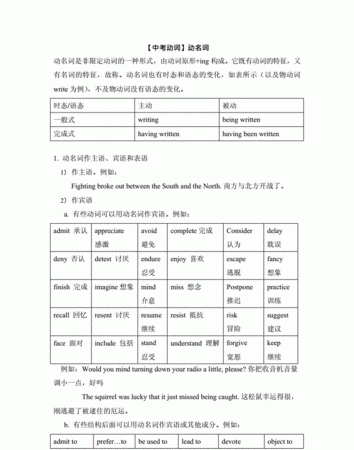本文目录
哪些动词后面只跟动名词
后面必须跟动名词 :
admit, abhor, acknowledge, advise, advocate, avoid, confess, consider, contemplate, defer, delay, deny, discontinue, excuse, evade, fancy, finish, imagine, include, involve, justify, keep(on), mind, necessitate, pardon, postpone, practise, renounce, resent, facilitate, favor, miss, resist
后面可跟动名词也可以跟不定式:
1) 意义区别不大。
He began learning (to learn) English at the age of five. 常见的动词有:start, like, hate, love, continue, prefer, commence, attempt, intend, propose, decline, endure, neglect, omit, recollect, recall, bear.
2) 意义有区别
a) remember doing sth 记住做过某事。remember to do sth 记住要做某事。
b) forget doing sth 忘记做过某事。forget to do sth 记住要做某事。
c) regret doing sth 遗憾做过某事。regret to do sth 遗憾要做某事。
d) try doing sth 试着做某事。try to do sth 努力做某事。
e) mean doing sth 意旨做某事。mean to do sth 打算做某事。
f) stop doing sth 停止做某事。stop to do sth 停下来做某事。
g) can't help doing sth 忍不住做某事。 can't help to do sth 不能帮做某事。
h) go on doing sth 继续做某事。 go on to do sth 接着做另一事。
动名词的逻辑主语有时同谓语动词的主语不一致时:
Do you mind my opening the window?

哪些词后面必须加动名词
在英语中某些动词之后只能跟不定式,有些只能跟动名词,有些既能跟不定式也能跟动名词,但它们有一些区别,现辨析如下:
一、只能跟不定式的动词:agree(同意),afford(买得起),decide(决定),desire(期盼),hope(希望),wish(希望),fail(失败),plan(打算),pretend(假装),promise(许
诺),refuse(拒绝),wouldlike(想要)等动词:例:Unluckily,Tomfailedtopasstheexam.Ihavepromisedtoreturnthebookontime.
二、只能跟动名词的动词:enjoy(喜欢),keep(坚持),mind介意),risk(冒险),finish(完
成),miss(错过),practise(练习),dis-
like(不喜欢),avoid(避免),consider(考虑),admit(承认)等动词:例:Doyoumindgivingmeahand?Maryhasfinishedreadingthenovel.
三、既能跟不定式也能跟动名词的动词:
remember(记住),forget(忘记),regret(遗憾),mean(打算),like(喜欢),intend(打算),need(需要),
try(尽力),goon(继续)等,但这类动词有些意义相近,有些意义截然相反:1、像like,begin等词后加不定式或动名词区别不大:如:liketodo表示想要做某一具体的动作
likedong表示一般或抽象的多次动作
它们在实际使用中区别很小。
2、后加不定式或动名词区别较大的动词:
如:1)remembertodo表示记住要去做某事(此事还未完成)
rememberdoing表示记住做过某事(此事已经完成)
2)needtodo表示主语人需要去做某事
needdoing表示句子的主语需要被做,意思含有被动,可以换成needtobedone
3)trytodo表示尽力做某事,相当于tryone’sbesttodo
trydoing表示试着做某事4)meantodo表示打算做某事
meandoing表示意味着什么
5)forgettodo表示忘记去做某事(此事还未完成)
forgetdoing表示做过某事而忘记了(此事已经完成)
6)stoptodo表示停下一切事而去干这件事
stopdoing表示停下手中的事
7)helptodo表示帮不上忙helpdoing表示避免
我朋友前几天也遇到这类问题,她去了奥威斯发展大厦29层进行学习后。这些问题全都解决了,英语口语也有提高,现在有出国准备了。

英语中哪些动词后接动名词
来来来,姐姐给你详细讲一讲
有些动词既可以跟宾语+doing,也可以跟所有格+doing,两种形式意思相近,所有格+doing的形式更正式,这类动词除了以下列举的还有detest, (dis)approve of, (dis)like, hate, love, object to=(dis)liking, fortet, imagine, remember, think of
例:I resented Tom winning the prize. = I resented Tom's winning the prize. (更正式)
Mia recalled him buying the book. =Mia recalled his buying the book. (更正式)
有些动词可以加to+doing,这类动词除以下列举还有adapt, adjust, admit, look forward, own up, resort
例:She confessed to stealing the money.
You don't object to working late tonight, do you?
注意,这类动词还可以跟to+名词短语
例:She confessed to the crime.
You don't object to the work, do you?
剩下的动词可以跟不同的介词+doing。例如:
by+doing (begin, close, end, finish (off/up),open,start (off/out))
例:Can you begin by cleaning the floors, and then do the windows?
on+doing或on+宾语+doing(concentrate, count, depend, focus, insist, rely)
例:Clare insisted on (Jack) wearing a suit to the party.
of+doing或of+宾语+doing(approve, hear, know, speak, talk, tell)
例:Have you heard of (anyone) getting arrested for gossiping beofore?
名词+from+doing(deter, discourage, keep, prevent, prohibit, stop)
例:The noise from next door prevented me from sleeping.
有些动词(feel, hear, notice, observe, overhear, see, watch)接宾语+doing或do,意义有轻微不同
例:I saw them playing football from my window. (playing强调的是过程)
I saw him smash the bottle. (动原smash表示动作已经结束)
I was able to watch them building the new car park from my office window. (building表示看到的是建造部分过程,没有从头看到尾)
I watched him climb through the window, and then I called the police. (climb表示见到了从开始到结束的完整过程)
dare和help后可带do或to do
I was angry with him, but I didn't dare (to) say anything.
We hope the Twitter campaign will help (to) raise awareness of the problem.
当dare后面跟着宾语,只能在宾语后加to do
例:I dared him to cross the river. (不能用I dared him cross...)
I helped them (to) pack.
have, let和make+宾语+动原,不能+to do
例:His exam results might make him work harder. (不能...might make him to work...)
I had Irena clean up her bedroom before I let her go out to play.

哪些动词后面只跟动名词
对于非谓语形式作宾语,大致有三种情况:
1. 只能用不定式作宾语。如 afford, agree, decide, decline, fail, hope, offer, pretend, promise, refuse, wish 等。
2. 只能用 -ing形式宾语。如 admit, avoid, consider, deny, delay, enjoy, finish, imagine, mind, practise, risk, suggest 以及 put off, give up 等。
3. 既能用不定式又能 -ing形式。如 begin, start, like, prefer, remember, regret, need, try, mean 等。
对于第3种情况中的许多动词,用两种形式还有一定的差别。
⑴ begin, start, continue 等,用两种形式一般没有明显区别。
⑵ like, love, prefer, hate 等,用不定式和 -ing形式通常也没有区别。但是对于 would like, would love, would prefer,就只能用不定式。
⑶ remember, forget, regret,不定式表示将来,-ing形式表示过去。(regret to do“遗憾地…”;regret doing“后悔做了”)
⑷ need, want, require,用 -ing的主动形式相当于不定式的被动形式。(need doing = need to be done)
⑸ stop, go on. stop doing “停止正在做的事情”;stop to do“停下来,去做另一件事”(这里 stop 是不及物动词,不定式是目的状语)。go on doing “继续做先前在做的事”,= continue doing = continue to do;go on to do“接着去做另一件事”。
⑹ try to do“尽力做”;try doing“试着做”。
⑺ mean to do“打算做”,= intend to do;mean doing“意味着…”。
⑻ help to do“帮忙做某事”;cannot help doing“忍不住…”。
另外,对于 allow, permit, advise, forbid,其宾语用 -ing形式,宾语补足语用不定式。allow doing, allow sb to do, etc.

以上就是关于50个后面跟动名词的动词 ,哪些动词后面只跟动名词的全部内容,以及50个后面跟动名词的动词 的相关内容,希望能够帮到您。
